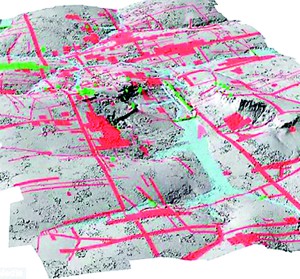Sunday Times 2
Lost medieval city found in Cambodia
A group of daring archaeologists uncovered a lost 1,200-year-old city on a misty Cambodian mountain by hacking through the thick jungle, strewn with live land mines.

Technology: The airborne Lidar system revealed a long-forgotten urban landscape
Yet they were also aided in their quest by some incredible technology that revealed the ancient city to them in the first place, and guided by a local – a one-legged former Khmer Rouge soldier.
Mahendraparvata, the city they found, is thought to pre-date the famous site of Angkor Wat by around 350 years and lies only 25 miles west of that huge temple.
Archaeologists believe Mahendraparvata was the first city of the Angkor Empire in 802 AD.
The expedition began in earnest after the team used Lidar technology on a helicopter.
The Lidar system uses pulsing laser signals to see through the thick undergrowth, where it detected a distinct outline of the the long-forgotten city.
It uses ultraviolet, visible, or near infrared light to image objects and can be used with a wide range of targets, including non-metallic objects, rocks, rain, chemical compounds, aerosols, clouds and even single molecules.
Damian Evans, director of the University of Sydney’s archaeological research center in Cambodia, told the Morning Herald of his

Ancestor: The new-found city predates the famous Angkor Wat temple by 350 years
‘eureka’ moment when the city appeared on his screen.
‘With this instrument – bang – all of a sudden we saw an immediate picture of an entire city that no one knew existed which is just remarkable,’ Evans said.
So his team headed into the perilous mountain countryside of Cambodia, along goat tracks, through deep bogs and around rivers, always avoiding the live land mines placed during previous conflicts.
The team discovered a whole urban landscape with canals, roads, caves and, as yet unexplained, mounds which could be tombs.
The archaeologist had one explanation for this: ‘One theory we are looking at is that the severe environmental impact of deforestation and the dependence on water management led to the demise of the civilisation … perhaps it became too successful to the point of becoming unmanageable.’
© Daily Mail, London
| WHAT IS LIDAR?
Lidar is a remote sensing technology that measures distance by shooting a laser at a target and analysing the light that is reflected back. It was first used in meteorology to measure clouds by the National Center for Atmospheric Research. The term lidar is a portmanteau of ‘light and ‘radar.’ Lidar uses ultraviolet, visible, or near infrared light to image objects and can be used with a wide range of targets, including non-metallic objects, rocks, rain, chemical compounds, aerosols, clouds and even single molecules. |
Follow @timesonlinelk
comments powered by Disqus

